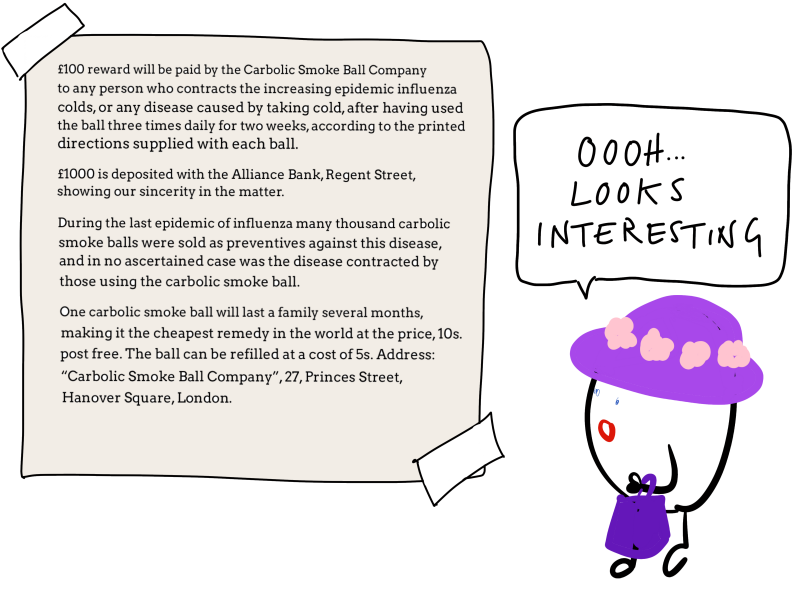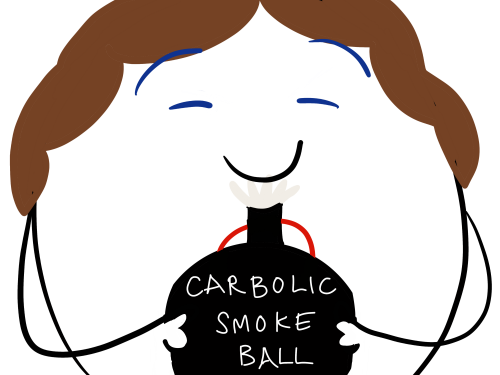Case Summary…the background to Carlill v Carbolic (1893)
Carlill v Carbolic Smokeball Company (1892), heard in the Court of Appeal, is a seminal contract law case dealing with unilateral offers and touching upon all of the essential elements of a legal contract including intention to create legal relations, acceptance and consideration.

The Offer
The company’s advert had offered £100 to anyone who bought and used their product but still caught influenza. This was a significant amount of money; the equivalent of about £9,000 today, it represented about 75% of a skilled tradesman’s annual wage at the time.
The Background
At the time that she bought her smokeball the world was in the midst of the Russian Flu Epidemic (c.1889-1895) which is estimated to have killed around one million people worldwide including Queen Victoria’s grandson, Prince Albert Victor.
The Smokeball
Despite the name the smokeball didn’t produce any smoke but was filled with powdered carbolic acid which the user squirted up their nose via a tube. The theory was that this would make the user’s nose run and flush out any infection!
What happened?
Mrs Carlill used the product three times a day for about two months. When she still caught influenza she claimed her £100. The Company at first ignored the letters from her husband but eventually replied stating that if she wanted to collect the money she would have to come into their office every day for a set period to use the ball and make sure that her claim was not fraudulent. Mrs Carlill refused and took the Company to court. Mrs Carlill was represented by her husband who was a solicitor and had encouraged her to fight the case. The Smokeball Company was represented by H. H. Asquith, a lawyer who went on to become Prime Minister in 1908.

How did the Company react?
As we all know the company lost. However, that didn’t stop the Company from trading, in fact the inventor of the smokeball and owner of the company Frederick Roe, turned the case to his advantage. Rather than drop the offer he upped it to £200 with the claim that as only three people, out of the many thousands that had bought the product, had ever tried to claim the £100 then the product had proved itself as an ‘invaluable remedy’. However, these adverts did include extra restrictive conditions to limit liability.
The law…
This landmark case marked the beginning of consumer protection law. It is still considered a foundational case with regard to unilateral contracts, and contracts in general, partly because so many different defences were put forward that had to be addressed by the judges.
OFFER – the advertisement was sufficiently clear and certain enough to be an offer. It was an offer to the whole world but a contract would be made only with those who performed the conditions set out. It was not ‘mere puff’, the claim that £1,000 had been put in the bank by the company was sufficient to prove this, especially as the advert itself states that this deposit is for ‘showing our sincerity in the matter.’
INTENTION – Again, the deposit of money by the company showed that they intended to create legal relations.
ACCEPTANCE – it was not necessary for the person performing the conditions to communicate their acceptance to the offeror, their completion of the conditions is acceptance.
CONSIDERATION – Mrs Carlill had provided consideration by buying the Company’s product rather than anything else based on the advertisement’s claims. The ‘inconvenience’ of squirting powdered carbolic acid up her nose was also set out as valid consideration.
And then…
Mrs Carlill’s lived to the age of 96, dying in 1946. The cause of death on her death certificate was influenza!
Read more here about how the case of Carlill v Carbolic is applied in contract law.
#carlilandcarbolic #carlillvcarbolic #lawstudyresources #unilateraloffers
